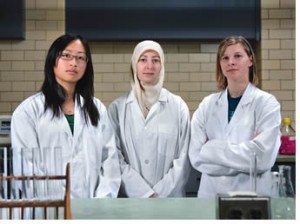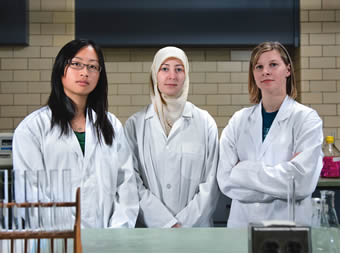Something peculiar happened this decade on the long road to gender parity in the Faculty of Applied Science and Engineering. While female students now outnumber men in law and medicine – two other traditionally male-dominated fields – their presence in engineering has waned. After hitting a high of 27 per cent in 2001, the proportion of female engineering students has dropped every year, to just 21 per cent in 2007. This year it rose slightly, to 23 per cent.
Professors and administrators aren’t exactly sure what caused the decline, but they do know the phenomenon is not confined to U of T. “[Female enrolment in engineering] seemed to plateau across North America,” says Professor Susan McCahan, a mechanical engineer who serves as the faculty’s First Year Chair. According to the Canadian Coalition of Women in Engineering, Science, Trades and Technology, the proportion of women enrolled in Canadian engineering programs has been declining steadily since 2002, after nearly a decade of slowly increasing numbers.
McCahan suspects the field may have an image problem – despite efforts to fight the stereotype of engineers as “supernerds” who work “for companies rather than people and the public good.”
The faculty is attempting to redefine engineering as a helping profession in which technical experts work with communities and tailor their efforts to local needs. “Research has shown that female students are interested in professions that have a positive effect on human life,” says Cristina Amon, the first female dean in the faculty’s 135-year history. She notes that certain disciplines – including chemical and environ mental engineering as well as biomedical engineering – are popular with female students because advances in these fields have a direct bearing on today’s pressing issues, such as the worldwide energy dilemma.

Recently, U of T’s Faculty of Applied Science embarked on a number of initiatives to attract female students. Mentorship is key, so U of T is hiring more women as professors. “In the last two years, over 50 per cent of our new hires have been female,” says McCahan. The Skule Sisters program sees high school girls corresponding with female engineering students, who help them plan for a career in the field. U of T also participates in the province’s yearly GoEngGirl Fair, which gives 12- to 15-year-old girls the opportunity to create machines, such as robotic arms and wind turbines.
Encouraged by this year’s increase in female enrolment, Amon and McCahan would like to see women engineers eventually take more positions in the workforce. Today, only about 10 per cent of professional engineers in Canada are women. However, McCahan says engineering can also take students into law, medicine or business. “The skills you get open up wildly diverse career opportunities.”
Recent Posts
U of T’s Feminist Sports Club Is Here to Bend the Rules
The group invites non-athletes to try their hand at games like dodgeball and basketball in a fun – and distinctly supportive – atmosphere
From Mental Health Studies to Michelin Guide
U of T Scarborough alum Ambica Jain’s unexpected path to restaurant success
A Blueprint for Global Prosperity
Researchers across U of T are banding together to help the United Nations meet its 17 sustainable development goals







One Response to “ Women Wanted ”
I’ve been a mechanical engineer since 1996, but I began my academic career as an English major. My reason for not originally choosing engineering was pretty simple – I didn’t know what it was. I graduated from high school with great marks in math and science, but little understanding of what sort of career I could pursue. When I began talking to engineering students, I learned that I could use math and science to design things. The idea that I could someday design roller coasters or Cirque du Soleil sets is why I left English for engineering. Many years later I do not work for Six Flags or the Cirque, but I love my career as a machine safety consultant.
Renée Frigault Kemp
Toronto